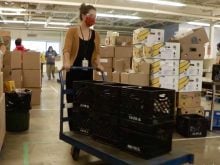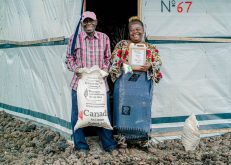Reuters / Empowering female farmers in developing countries is crucial to solving the world’s food problems, according to the chair of a panel which advises governments and donors on agricultural development in sub-Saharan Africa.
“If we’re going to feed the world and in particular if Africa is going to be fed, we need every tool we can lay our hands on to make that happen and one component of that is to ensure that women fulfil their potential as farmers,” said Gordon Conway, chair of the Montpellier Panel.
Read Also

GATE project nears 50 per cent of fundraising goal
Farmers at the SaskWheat annual meeting hear GATE raises $42.65 million, but questions continue over cost of Cereals Canada project.
“Women are constrained by the fact that they don’t have enough access to productive resources and they don’t have enough access to assets and if they did, they could increase yields on farms by 20 to 30 per cent, which would have a really big impact.”
If women upped their production by this amount, the agricultural output of developing countries would rise by between 2.5 and four per cent, which could slash the number of undernourished people by 12 to 17 per cent, according to the United Nations’ Food and Agriculture Organization.
Women account for around 43 per cent of agricultural labourers in developing countries.
But poor access to land, water, fertilizers, seeds and technical knowledge is limiting their productivity, Conway said.
“In many ways it’s a cultural thing,” he said. “Men tend to have the rights to land in particular and the rights to other resources… the woman is doing the work but she hasn’t got real access to what she needs.
“Everywhere you go in Africa, particularly in rural villages, you can see that women are often regarded as second-class citizens.”














